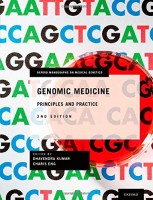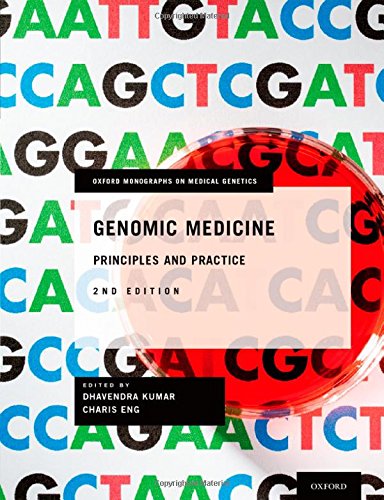 This is part of the series entitled: Oxford Monographs on Medical Genetics
This is part of the series entitled: Oxford Monographs on Medical Genetics
Editors: Dhavendra Kumar, MD, and Charis Eng, MD
Publisher: Oxford University Press – 814 pages
Book Review by: Nano Khilnani
As some of you know, the 2012 Nobel Prize in Medicine or Physiology was awarded to Shinya Yamanaka, a professor at the Institute for Frontier Medical Sciences at Kyoto University, for his pioneering research no stem cells, a subject studied in genomics.
This is a rare and unique book, since there are few if any such works in the new and rapidly growing field of genomic medicine, both by way of research and practice. The word genome, consisting of gene and ome, means complete knowledge of all the genes, or the genetic constitution or sequence of genes in a single organism. The suffix omics (e.g. economics) means in-depth knowledge.
Why is genomics such an important area of study in biology and medicine? Dr. Kumar explains: “Developments and advances in genetics have led to a better understanding of the principles governing heredity and the familial transmission of physical characteristics and diseases, better understanding of the pathophysiology of diseases, the development of new methods of clinical and laboratory diagnosis, and innovative approaches to making early diagnoses (e.g. prenatal diagnoses and new born screening) and offering reproductive choices, including pre-implantation genetic diagnoses.”
In the first edition of this book by Dr. Dhavendra Kumar and Sir David Weatherall published in 2008 and entitled Genomics and Clinical Medicine, an overview of genomics was provided, including advances in susceptibility to various diseases, diagnosis, and prediction of treatment outcomes in the various specialties in medicine.
Since then genomics has had advances with the help of new discovery tools in relatively newer areas of science such as bioinformatics and biotechnology. These advances have not only given us insight into diseases but also opened up exciting new vistas of discovery for greater biological and medical understanding of our bodies, our predisposition to disease in general and some diseases in particular.
The discoveries have answered questions such as why some of us contract certain diseases while others do not. They have also provided us answers to why others get some diseases and we do not. These questions and answers go beyond the scope of the science of heredity.
This second edition of that book, now named Genomic Medicine – Principles and Practice, has been extensively revised and the new findings have been added to it.
Eighty-seven doctors and other specialists in genomics, genetics, genetic medicine, and allied fields authored the 50 chapters in this book. They are mainly in the United Kingdom, but also from: Australia, France, India, Israel, Italy, Japan, the Netherlands, Qatar, Republic of Ireland, Singapore, and the United States.
All the content in this book has been organized into two broad Parts, namely: Principles of Genomic Medicine, and Genomics in Clinical Practice.
The first part of the book deals with topics such as: genes, genetics and human genomics; the human genome – structure and organization; human proteomics; epigenetics, epigenomics, and human disease; bioinformatics; pharmacogenomics – a critical component of genomic medicine; new drug development, drug response, and precision medicines; nutritional genomics; biobanking and genomics-based translational medicine; ethical, legal and social issues in clinical genomics; the regulation of human genomics research, and other subjects.
In the second part, on how discoveries through genomics are being applied in clinical practice, you will read chapters dealing with such topics as the following: genetic and genomic approaches to clinical medicine; separate chapters on genomics of these diseases and ailments: complex cardiovascular disease, type 2 diabetes mellitus and obesity, osteoporosis and related disorders, chronic kidney disease, chronic inflammatory bowel disease, bronchial asthma, seizure disorders, multiple sclerosis, common dementias, cancer, genetic eye disease, and other diseases.
This is a pioneering work of two doctors who as editors, have undertaken a monumental project, compiling a lot of relatively new knowledge put on paper by a total 50 pioneers in genomic medicine. All the authors and Drs. Kumar and Eng are to be congratulated for this unique, massive contribution to better understanding of disease so that eventually, millions of people can benefit from their work, to lead healthier lives. .
Editors:
Dhavendra Kumar, MD,, FRCP, FRCPCH, FACMG is with the Institute of Cancer and Genetics at Cardiff University School of Medicine; All Wales Medical Genetics Service at University Hospital of Wales in Cardiff. He is also with Genomic Policy Unit on the Faculty of Life Science and Education at the University of South Wales in Pontypridd, UK.
Charis Eng, MD, PhD, FACP holds the Sondra J. and Stephen R. Hardis Chair of Cancer Genomic Medicine. He is Director of the Genomic Medicine Institute, and Center for Personalized Genetic Healthcare at Cleveland Clinic; and Professor and Vice Chairman of Genetics and Genome Sciences at Case Western Reserve University School of Medicine in Cleveland, Ohio.







